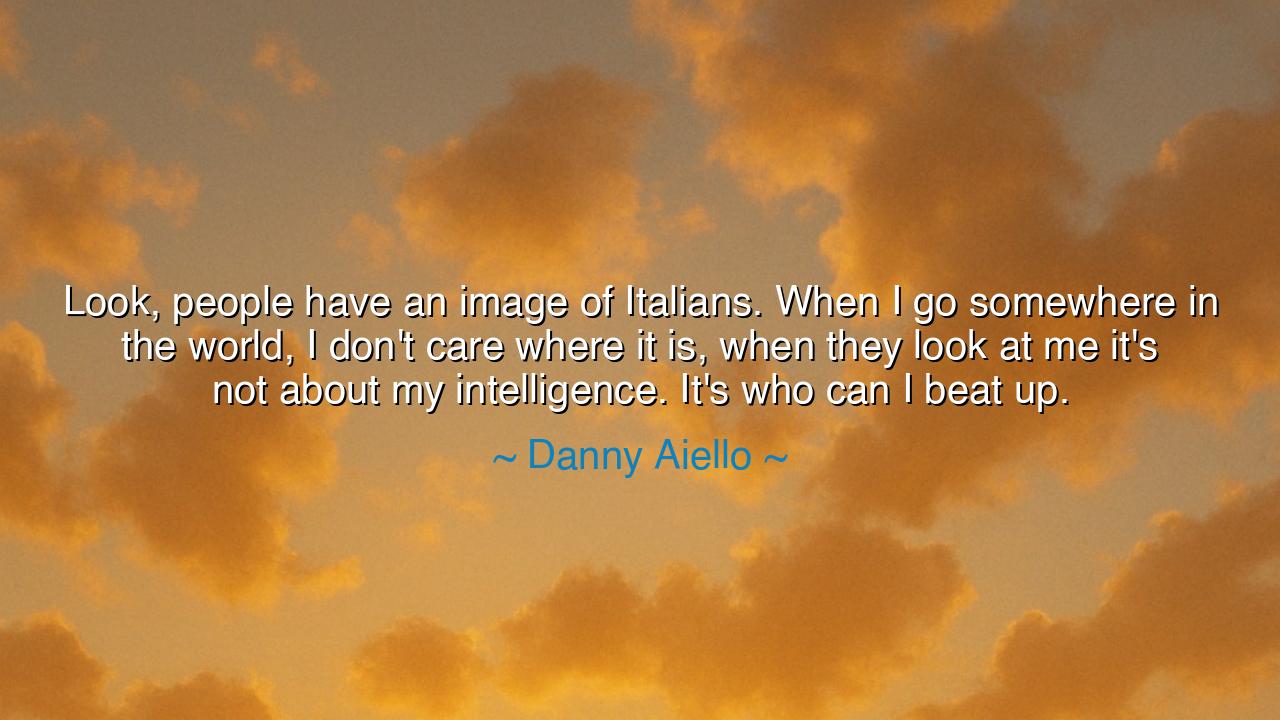
Look, people have an image of Italians. When I go somewhere in
Look, people have an image of Italians. When I go somewhere in the world, I don't care where it is, when they look at me it's not about my intelligence. It's who can I beat up.






In the blunt yet deeply human words of Danny Aiello, the great actor who carried both toughness and tenderness in his craft, we hear the lament of one who has lived beneath the weight of stereotype: “Look, people have an image of Italians. When I go somewhere in the world, I don’t care where it is, when they look at me it’s not about my intelligence. It’s who can I beat up.” Beneath this statement lies not bitterness, but truth — the truth of how easily the world imprisons people in the cages of their image, seeing not their mind or their heart, but only what they expect to see. Aiello, who rose from the streets of New York to the bright lights of Hollywood, knew the double-edged sword of identity — that one’s heritage can be a source of pride, and yet also a mask that others refuse to look beyond.
The origin of this quote rests in Aiello’s own experience as an Italian-American actor during an era when Hollywood often painted Italian men in broad, violent strokes — gangsters, thugs, and enforcers. Though Aiello himself was a man of deep emotion and intelligence, his rugged voice and features made him a natural fit for roles that embodied strength, anger, and power. Yet, as he reflected later in life, the world’s gaze upon him was rarely one of curiosity about his soul or intellect; it was the gaze of assumption. “It’s who can I beat up,” he said — the world saw the fighter, but not the thinker, the heart beneath the muscle. In those few words, Aiello speaks not only for himself but for all who have ever been judged by the surface, denied the chance to show their depth.
Throughout history, the same struggle has echoed across every culture and generation. The philosopher Epictetus, himself born a slave in ancient Rome, knew the pain of being defined by station rather than spirit. He once said, “It’s not what happens to you, but how you react to it that matters.” Like Aiello, he understood that the judgments of others cannot confine a soul that knows itself. Yet the wound remains: when the world sees only your face and not your essence, it demands courage to persist, to continue living with dignity while unseen. Aiello’s lament becomes, therefore, not merely personal but universal — a mirror held up to the world’s habit of reducing individuals to symbols.
Aiello’s words also carry a quiet strength. There is no self-pity in them, only awareness. He does not seek to reject his heritage or the image attached to it; rather, he seeks to remind us that a man — any man — is more than the sum of what others project upon him. In that sense, his quote speaks to the duality of identity: that our roots shape us, but they do not define our potential. The Italian heritage that Hollywood caricatured as violent was, in truth, the inheritance of poets, philosophers, and artists — Dante, Michelangelo, Leonardo da Vinci — men whose genius reshaped the world. Thus, Aiello’s frustration is not with his heritage, but with the ignorance of those who refuse to see beyond the stereotype to the full humanity that lies beneath.
Consider the story of Jackie Robinson, the first African American to play Major League Baseball. Like Aiello, Robinson carried not only his personal ambition but the burden of a collective identity — one misjudged, dismissed, and despised by many. When he took the field, the world saw not his skill or intellect, but his color. Yet through discipline, grace, and excellence, he broke through prejudice and changed the course of history. Robinson’s struggle and triumph reveal the same truth Aiello’s words point to: that identity, when misused, becomes a prison; but when owned and elevated through character, it becomes a source of power.
The lesson of Aiello’s words, then, is both simple and profound: do not allow the gaze of others to define you. The world will always have its categories, its assumptions, its lazy visions. People will look at you and see what they expect — your gender, your race, your accent, your past — but not who you truly are. The wise soul must rise above such blindness, not in anger, but in quiet defiance. Show them your intelligence, your integrity, your humanity — not through words of protest alone, but through the consistent excellence of your deeds. In this way, you break the chains of perception not by force, but by example.
So, my child of dignity and fire, remember Danny Aiello’s hard-won wisdom. When the world sees only the mask, keep nurturing the mind and heart beneath it. When they see the fighter, show them the philosopher; when they see the stereotype, reveal the soul. Let not the limits of others become your own. For every image the world imposes, there is a deeper truth waiting to be seen — and it is your task, through courage and authenticity, to make that truth impossible to ignore. Then, like Aiello, you will stand not as a reflection of their expectations, but as the embodiment of your own unbreakable self.






AAdministratorAdministrator
Welcome, honored guests. Please leave a comment, we will respond soon